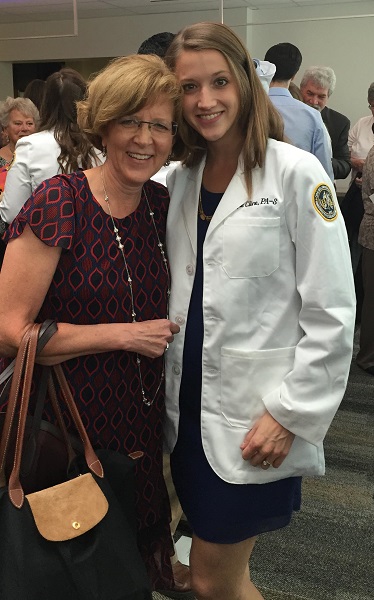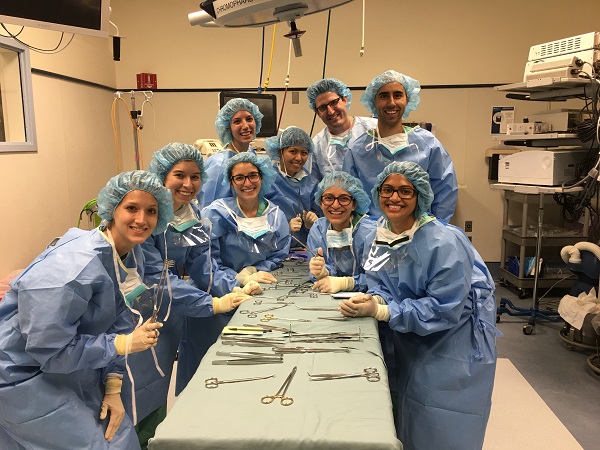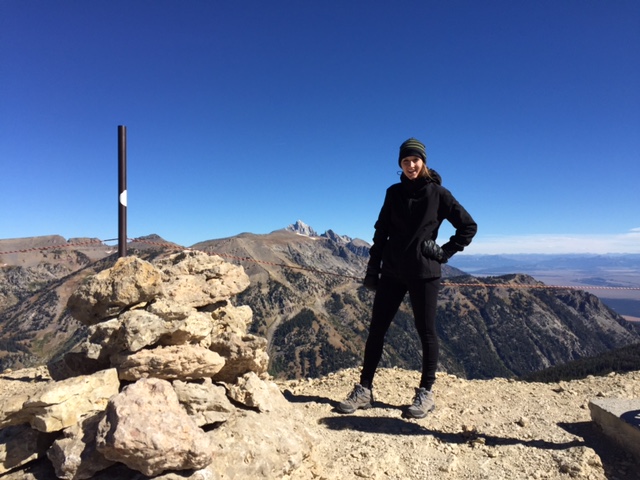Out of the Womb and Into the Clinic
October 31, 2017
To say that medicine is in physician assistant (PA) student Hope Johnston Cline’s genes is a gross understatement. Her grandparents are doctors. Her mom is a physician assistant from Drexel’s class of 1983. Her dad, two brothers and most of her aunts, uncles and cousins are doctors. Wouldn’t it be fascinating to study their deoxyribonucleic acid!
 Of course, Cline knew science was it for her. Being like her family members, very compassionate caregivers, was important to her. What they did and how they did it made a career in healthcare appealing to her. “I debated between veterinary, PA and medical school, but eventually I chose PA because I really love the flexibility it allows,” she offered. Less time in school and fewer loans were also enticing. But the biggest draw of being a physician assistant is practicing primary care. For her, it’s the depth of getting to know your patients and its well-roundedness. “I love when a patient comes in with all types of issues. I like how you can dig into their lives a little bit by following up with them. You see them more than one time, get a good relationship with them. I can make a difference in their overall health—not like a specialty when you're focusing on just one area,” Cline revealed. She and her brothers often talk about medicine and what both binds and separates them as doctors and PA. Where she feels that doctors have opportunities to do research and that their education dives much deeper into microbiology, chemistry and histology, she feels that physician assistants look specifically at what is presented by the patient immediately. “PAs go straight for the meat: What is it? What medication should be prescribed and what is the follow-up,” Cline said. “My brothers and I would say we have a similar approach in managing an illness—what to do right then and there for the patient right in front of us. But if you want to know more about rare diseases or very specific pathophysiology, they’re the ones to ask. Their training is more extensive, she added.
Of course, Cline knew science was it for her. Being like her family members, very compassionate caregivers, was important to her. What they did and how they did it made a career in healthcare appealing to her. “I debated between veterinary, PA and medical school, but eventually I chose PA because I really love the flexibility it allows,” she offered. Less time in school and fewer loans were also enticing. But the biggest draw of being a physician assistant is practicing primary care. For her, it’s the depth of getting to know your patients and its well-roundedness. “I love when a patient comes in with all types of issues. I like how you can dig into their lives a little bit by following up with them. You see them more than one time, get a good relationship with them. I can make a difference in their overall health—not like a specialty when you're focusing on just one area,” Cline revealed. She and her brothers often talk about medicine and what both binds and separates them as doctors and PA. Where she feels that doctors have opportunities to do research and that their education dives much deeper into microbiology, chemistry and histology, she feels that physician assistants look specifically at what is presented by the patient immediately. “PAs go straight for the meat: What is it? What medication should be prescribed and what is the follow-up,” Cline said. “My brothers and I would say we have a similar approach in managing an illness—what to do right then and there for the patient right in front of us. But if you want to know more about rare diseases or very specific pathophysiology, they’re the ones to ask. Their training is more extensive, she added.
Starting her undergraduate career with a pre-vet stint as she called it, Cline ended up choosing nutrition as a major. She became familiar with gastroenterology while a medical assistant and found that she really like learning about the GI system. Despite the fact that she continued debating between medical and PA school, nutrition would give her a different perspective on health while providing a solid base no matter which she picked. Once she chose to become a physician assistant, she immediately started looking for programs in Philadelphia and quickly zeroed in on Drexel. “I thought that it would be so cool to go to the same school my mom went to,” Cline admitted. She recognized, too, that CNHP had one of the oldest and most well-established programs in the country. “I knew they had great curriculum and really knew what they were doing.” Drexel was her first choice.
The small number of spots in Drexel’s PA program are highly coveted despite its rigor. Cline acknowledged how challenging it was to balance the volume of content with expectations simultaneously avowing how much she loved it. “I thought it was awful sometimes, but I really liked being pushed like that and seeing how much I could do. But there were definitely some moments where I just wanted to curl up in a ball and die because it's so much,” she laughed. Even with this, Cline was able to recite a litany of things she loved about the program starting with its focus on social justice and service of others. There are many reasons for healthcare disparity including cultural bias, sexual orientation, racism and stigmas around mental health, but CNHP’s PA program looks at all those issues to build an understanding of how these attitudes affect what is available to whom and how. This is something at really appealed to her. She remembered her first project starting with reading a book about cultural differences affecting care. Another thing Cline expressed was her appreciation for Megan Schneider, her favorite professor. Schneider, a clinical instructor in the PA program, was Cline’s advisor on her graduate project, a paper about the implications of race in diagnosing mental health. “I really look up to her. She does everything with excellence,” enthused Cline. “She was very encouraging and knowledgeable. She’s taught me a lot,” she explained.
 It's hard to believe, but Cline has a life outside of school. She and her husband Stephen Cline, an engineer, will be moving to Oregon in January where she hopes to find a job working with underserved populations. If she can find five minutes when she’s not studying, working or on rotation, you will find her somewhere enjoying the great outdoors—probably running on at trail with her husband. She finds great enjoyment riding horses though she hasn’t had much time to do that recently. Maybe once she’s finished her last rotation finds a job and gets settled in Oregon, she’ll find a little more time for some of the other thing she loves alongside developing her niche in primary care.
It's hard to believe, but Cline has a life outside of school. She and her husband Stephen Cline, an engineer, will be moving to Oregon in January where she hopes to find a job working with underserved populations. If she can find five minutes when she’s not studying, working or on rotation, you will find her somewhere enjoying the great outdoors—probably running on at trail with her husband. She finds great enjoyment riding horses though she hasn’t had much time to do that recently. Maybe once she’s finished her last rotation finds a job and gets settled in Oregon, she’ll find a little more time for some of the other thing she loves alongside developing her niche in primary care.
Things I like or would recommend:
Book: State of Wonder by Ann Patchett The author is flipping my mind, but it’s incredible.
TV Show or Movie: Oh, man! This is hard. I think everyone should be watching Downton Abbey.
Podcast: I’m not interested in any currently, but I am listening to Harry Potter. I’m a little embarrassed because I’ve never used this media type.
Written by Roberta S. Perry